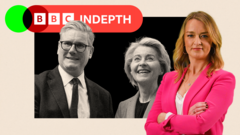No sequins or dancing at EU summit – but it’ll be an extravaganza nonetheless


Laura Kuenssberg
Presenter, Sunday with Laura Kuenssberg•@bbclaurak

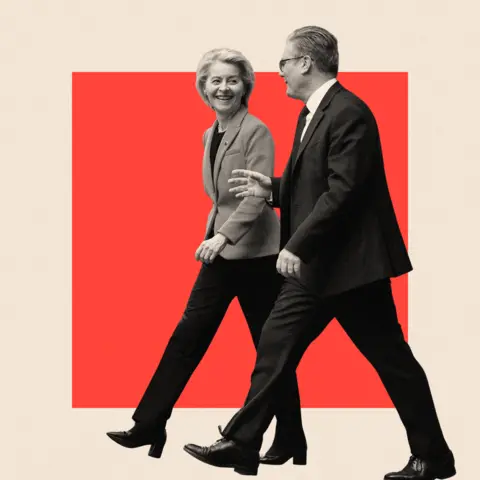 BBC
BBC
Stand by for a dazzling European event. Cameras everywhere. Famous faces. Red carpets.
No, not Eurovision in all its noisy glory, but the first European summit of what the prime minister hopes will be a new era, where governments around the continent concentrate not on instant verdicts – douze points or nul points – but on creating long-term relationships that make life easier.
The UK is hoping to show that just as you don’t have to be European to enjoy Eurovision, you don’t have to be in the European Union (EU) to get some of the benefits of the club.
Expectations of Monday’s summit are high. One minister joked they hope you’ll “Remember Monday” – get it? It’s a moment to fix what they consider were the mistakes of Boris Johnson’s Brexit deal.
It’s the first formal summit for European leaders since Brexit, and Downing Street is going for the full extravaganza: the grandeur of London’s Lancaster House, a warship brought up the Thames to be shown off and used as a lunch venue, then, it’s hoped, even a press conference in the Downing Street Rose Garden. “It’s clearly designed for the telly – everyone will be there apart from the King and Paddington Bear,” said a diplomatic source about the plans.
The atmosphere is entirely different to the last time the UK and the EU circled each other at a formal summit. The two main negotiators – Nick Thomas-Symonds for the UK, who’ll join us in the studio on Sunday, and the EU’s Maros Sefcovic – have struck a friendly partnership, sinking wine (Slovakian reds) and whisky (Welsh).
What’s the actual point of the summit? In private, government insiders are not expecting a giant whizz-bang new deal with our closest trading partners. The public gave Labour permission to improve the existing Brexit agreement in the general election but not totally rewrite it, and the EU doesn’t have the mandate from its members to draft something totally new either. Be on guard for any declarations of a heroic or profound shift.

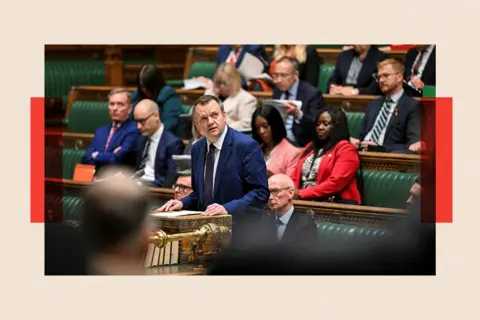 Reuters
Reuters
But it’s a significant moment nonetheless, after all those years of bitterness and brinkmanship, and the government hopes there will be meaningful agreements, particularly on defence, opening up billions of euros to UK firms, and tidying up some of the existing cooperation between the UK and EU countries on security.
Expect an easing of the admin hassles Brexit created for farmers and the food industry – sanitary and phytosanitary arrangements, or SPS to use the horrendous jargon.
There will be important commitments – diplomatic language at least – on energy, on migration, agriculture, on data sharing, the list goes on. My colleague Damian Grammaticas has taken a closer look at some of the issues here.
In the classic tradition of UK-EU negotiations, though, there is heavy briefing from sources on both sides that it’s “going to the wire”. Will there be a deal to allow young Brits and EU citizens to live and work more easily in each other’s countries? Sir Keir Starmer has insisted that such a scheme would not amount to a return to pre-Brexit freedom of movement, and that it would be a “reciprocal” arrangement in which young people would be able to move abroad for up to two years (the EU has been pushing for stays as long as four years to be allowed).
As I write I’m told only an “agreement in principle”, not the real final deal, will be ready for Monday.
Will the French (who sources are referring to when they talk diplomatically about “coastal states”) relent on demands for more protection for their fishing fleets in return for giving the UK the kind of favours it wants? “The French have been trying to link fish to lots of things,” a source close to the talks says – it might be five years since we left the EU, but maybe the more things change, the more things stay the same.

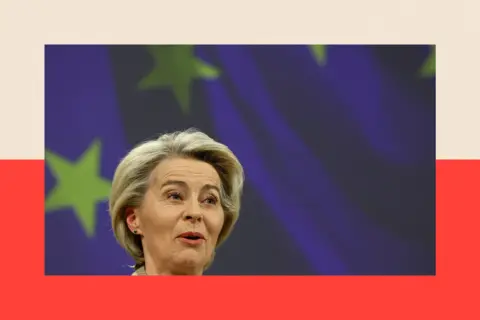 Reuters
Reuters
Indeed, just like on so many occasions during the Brexit wrangles, as we go on air this weekend, EU ambassadors will be gathering at their COREPER (Comité des représentants permanents) meeting to go through the agreement. Nothing is agreed until everything is agreed. And even then, agreements in principle will leave many details to be hammered out in the weeks and months to come.
For the UK government, agreement of any sort means “we’ll have scored the hat trick”, says one minister. No one in government would dream that Monday will mean an end to their domestic woes, but a trade deal with India, an agreement with the US, and then the EU gives evidence of progress, and insiders hope it could build on a sense that Sir Keir’s operation and the economy has picked up some pace.


Sign up for the Off Air with Laura K newsletter to get Laura Kuenssberg’s expert insight and insider stories every week, emailed directly to you.


“It’s not just about the footnotes of a trade agreement – it’s also about the vibes,” says a government source. Put three deals together with better growth figures last week and maybe, just maybe, the doom generated in part by Downing Street itself is fading.
But not so fast! It will be imperative to look at the footnotes of any text that emerges on Monday. Cash and the power of the EU courts were both toxic issues during the Brexit era – so what extra cash might the UK be asked to contribute if it’s joining in with some EU schemes? Access won’t come for free, though I’m told the UK would not contribute to the overall EU budget. And to what extent will the UK be expected to accept authority of EU rules?
There are clear political sensitivities around any sense the government is giving too much back to Brussels. Ministers hope to be able to outline extra cooperation to combat illegal migration, and to present the changes as practical measures to make the existing arrangements work better: not the kind of deal that would excite Remainers’ hearts, nor anger Brexiteers.

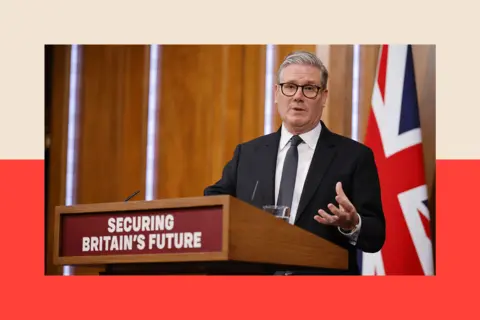 EPA-EFE/Shutterstock
EPA-EFE/Shutterstock
Sir Keir’s promise of a “reset” with the EU may not quicken the pulse, but his team hopes that it will be “another delivery moment” – in other words, another chance for them to say to a cynical and obviously disappointed public: look, we said we’d get a more sensible deal with the EU after all that Brexit hassle, and that’s what we’ve done.
The irony is that the man who was once seen as Labour’s Remainer-in-Chief is now, as prime minister, trying to fill in the blanks and smooth the many wrinkles of the Conservatives’ original Brexit deal. “It might be a broken record,” says a diplomatic source, “but at least they are trying to fix it”.
Monday might not have the sequins and screeching choruses of tonight’s Eurovision, the inexplicable dance routines or pyrotechnics, but it will be a show no less. The source adds: “Maybe it will be Starmer who will drive some sort of Humvee that says ‘got Brexit done’ on the side.”
BBC InDepth is the home on the website and app for the best analysis, with fresh perspectives that challenge assumptions and deep reporting on the biggest issues of the day. And we showcase thought-provoking content from across BBC Sounds and iPlayer too. You can send us your feedback on the InDepth section by clicking on the button below.


